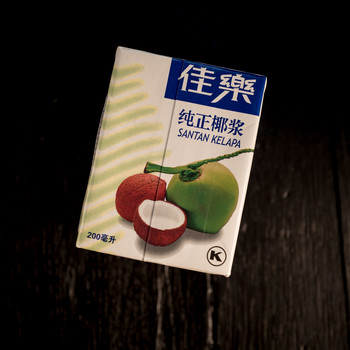Krachtige tomatensaus met ansjovis voor vleesgerechten (kalfsvlees) of vis.


What is it called?
The "1st pressing":
coconut cream, coconut cream, santen kental.
The "2nd pressing":
coconut milk, beating milk, santen.
The concentrated / boiled version:
coconut cream, creamed coconut, block santen.
What is it?
Coconut milk comes from the grated white flesh of a ripe coconut that is mixed and kneaded with hot water. Usually just water, sometimes the so-called coconut water from the coconut. Then the mixture is squeezed into a cheese cloth, the thick, creamy liquid is called coconut cream. This process is repeated, the coconut pulp is therefore mixed with warm water for a second time, the moisture that is now squeezed out is less thick and is called coconut milk. What one sells in canned form as coconut milk is often a mixture of the two and can vary enormously in thickness / fat content. Because fresh coconut milk can start souring within a day, it was reduced. We know those blocks of concentrated coconut milk (coconut cream) from the Indonesian kitchen and have a shelf life of many months. (not to be confused with coconut fat or coconut oil)
How to use?
Such a block of santen can be diluted with hot water to make coconut milk (1 block is enough for 1 liter of coconut milk), but that is less tasty than coconut milk from canned. However, I often prefer coconut cream for Indonesian dishes and coconut milk for canned food. Cans of coconut cream can be diluted with water if you think your dish is too creamy / powerful. You can only keep frozen coconut milk, cream or diluted coconut cream in the refrigerator for a short time, freezing is no problem. Use an ice cube bag / tray if you regularly need small bits.
From: Robin's website http://www.aziatische-ingredienten.nl



